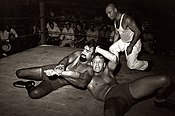
Back Kayfabe Danish Kayfabe German Kayfabe French Kayfabe Italian ケーフェイ Japanese Kayfabe Dutch Kayfabe NB Kayfabe Polish Kayfabe Portuguese Кейфеб Russian
| Part of a series on |
| Professional wrestling |
|---|
 |

In professional wrestling, kayfabe (/ˈkeɪfeɪb/) is the portrayal of staged events within the industry as "real" or "true", specifically the portrayal of competition, rivalries, and relationships between participants as being genuine and not staged. The term kayfabe has evolved to also become a code word of sorts for maintaining this "reality" within the direct or indirect presence of the general public.[1]
Kayfabe, in the United States, is often seen as the suspension of disbelief that is used to create the non-wrestling aspects of promotions, such as feuds, angles, and gimmicks in a manner similar to other forms of fictional entertainment. In relative terms, a wrestler breaking kayfabe would be likened to an actor breaking character on-camera. Since wrestling is performed in front of a live audience, whose interaction with the show is crucial to its success, kayfabe can be compared to the fourth wall in acting, since hardly any conventional fourth wall exists to begin with. Because of this lack of conventional fourth wall, wrestlers were once expected to maintain their characters even out of the ring, and in other aspects of their lives that could be made public. In general, everything in a modern professional wrestling show is to some extent scripted, or "kayfabe", even though at times it is portrayed as real-life, where it was once portrayed as real rivalries being conveniently settled by unscripted wrestling matches.
Kayfabe was fiercely maintained for decades with the intent to deceive fans, but with the advent of the Internet wrestling community, and the sports entertainment movement, the pro-wrestling industry has become less concerned with protecting so-called backstage secrets and typically maintains kayfabe only during the filming of shows. It is occasionally broken during shows, usually when dealing with genuine injuries that occur during a match or paying tribute to wrestlers.
- ^ Washington, Tecoa T. (2009). Medieval Bedazzle. Mustang: Tate Publishing. ISBN 9781606046951. Retrieved August 16, 2012.